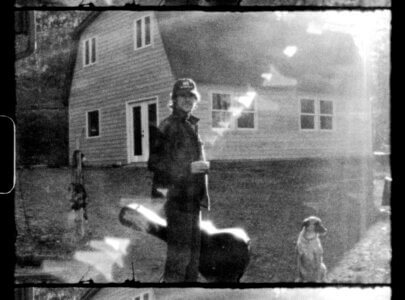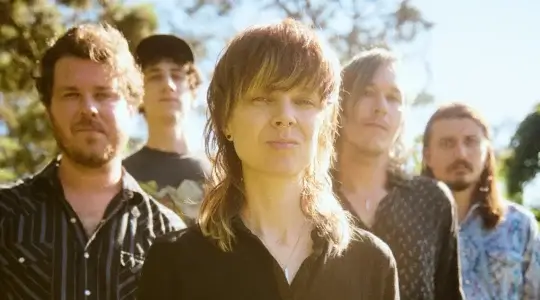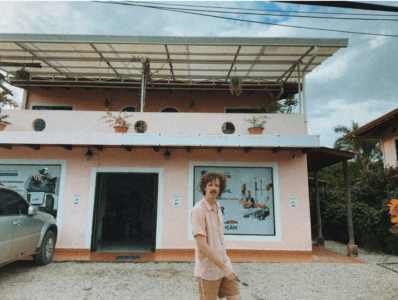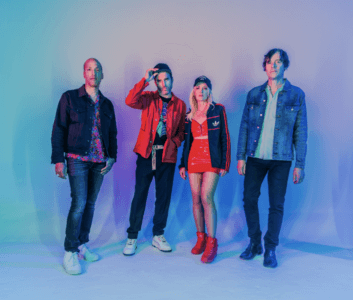cleopatrick Exude Honesty

Hailing from the small town of Cobourg, Ontario, cleopatrick has made a major impact in a relatively short time. Released on their own label, Debut EP “The Boys” has amassed over 60 million streams on Spotify and the group has toured North American and Europe while receiving major support from many notable publications.
The two band members, Luke Gruntz (Vocals, Guitar) and Ian Fraser (Drums) manage to create a massive sound incorporating their mutual love of hip-hop and combining it with influences of classic rock and singer/songwriters. Their debut full-length album “Bummer” will be released via Nowhere Special Recordings/Thirty Tigers/The Orchard, on June 4th. Jahmeel Russell spoke to both of them ahead of its release.
NT: Congrats on the new record. How does it feel to have your first full-length album finally being released?
LG: So weird. We don’t even know what to feel like. We just got a box of CDs shipped to my house the other day and Ian came over so we could open them together and we were just holding them and we just kept repeating “wow”.
NT: You guys have been friends since you were very young. When did you decide you wanted to be musicians? Did one of you start playing and then encourage the other to take up an instrument?
IF: We both started playing guitar around the same time and have been playing songs together showing each other riffs that we learned for as long as I can remember but it wasn’t till after high school that we really decided to try to take the thing this thing seriously. You know how being out of high school and kind of not knowing what you want to do with your life is, and music was kind of one of those things that had always just made sense to us. At that point, I had been playing the drums quite a bit more and actually started considering myself a drummer. We decided pretty much straight after high school that we wanted to at least give this thing a try.
NT: Is your longstanding relationship the reason why you decided to be a two-piece?
LG: Maybe partially, we were never a two-piece because we thought it would be cool like it was like a shtick. It was just purely the result of, we couldn’t find a bass player and so we made do. I do think our relationship has allowed us to feel like we’re not missing anything. So in a way, it’s made it easy enough to just stay a two-piece.
NT: Have you ever felt limited by being a two-piece?
LG: It’s definitely a limitation but it’s something we welcome. It’s fun to be challenged in songwriting, and in performance, especially in guitar music, where so much has been done in this genre. There’s a footprint in every corner. It’s nice to have a limitation to force you to think outside the box.
NT: How did you end up working with Jig Dubé on this record?
IF: Jig is in a band called Zig Mentality who we became friends with about three years ago now and there’s been a lot of dialogue between us and another band that we’re really close with called Ready the Prince. The three of us musically, and idealistically really get along and share a lot of the same passions and interests. There was one specific night we had played a show in Ottawa and we were hanging out at the guys in Zig Mentality’s place and they showed us their record they had just been working on. It was produced by Jig along with Quinn and Liam (Dubé, also of Zig Mentality). They all had a hand in it, but it really was Jig’s baby at that time and it blew us away. We just fell in love with this sound that pretty much had been in our heads for the last five years. They really tapped into this sound that we felt was something we were looking for and we were almost immediately like, let’s do stuff together. It really was organic like that.
NT: What did Jig bring to the table with his production? Did he get involved in the arrangements or melodies of the songs?
LG: A little bit, I guess that’s the deeper stuff that he would only jump in if we threw it out there, like, what do you think? Jig’s main part was the sonics and balancing the live energy that we were trying to capture. Like a live rock show vibe, with hard-hitting, punching drums and big low end of our hip hop influence and stuff like that. We wanted it to kind of bring these worlds of sound together like something that feels well produced and sounds great on any sound system, especially in the car, but also has this homemade garage kind of vibe and Jig was the guy that knew how to do that.
NT: I was actually curious about the low end on the record because you don’t have a bass player. Are you just using an octave pedal on the guitar? Is there any extra gear that you brought into the studio to use for the recording just to amp it up a bit more?
LG: Yeah, that’s all done through an octave pedal. Live I run two amps and I have a toggle that I can turn on and off for this low-end signal. Kind of like a ghost bass player playing along with us. It’s perfectly synced up with whatever I’m playing on guitar, but it’s pitched down and put through a bunch of EQ and compression to make it sound like a big fat bass and that’s how we tracked in the studio. We considered trying to use a real bass on certain parts of songs to get extra low end but my rig just sounded the most awesome and the most like us. So all those guitar parts and the bass parts were done live simultaneously.
NT: That’s cool that you were able to record it that way and get the sound you wanted to achieve but that must tailor the way you play the guitar, knowing that you have to think about what the bass would be doing.
LG: Yeah, exactly. That’s one of those limitations that’s fun. I can write a song, but I can’t play barre chords. There are only certain intervals I can play where the bass doesn’t get too muddy, but the guitar can still kind of shine through. So I can only emphasize fifths and sevenths and all these different things that I don’t really think about very consciously. There’s a certain muscle memory to it. If I want the guitar to sound like a chord there’s only so many ways I can do it, because I might jeopardize the low end.
NT: Some of the songs on Bummer sound like they would be right at home on rock radio. Did you put any pressure on yourselves to write singles for this album after the success you had with “Hometown”?
LG: Not really. We just put care into making the most of every chorus and we kind of have this unspoken rule in songwriting that every song has to have an iconic moment in it. Whether it’s a lyric or some musical thing that happens that kind of defines that song. It’s the moment when you’re playing it live, that everyone’s waiting to engage in and I think that often that lends itself to feeling accessible, or like feeling kind of radio-friendly.
IF: It’s kind of more the opposite, I would say. I think we just make a point of not having any filler and in our eyes, this album could be played front to back as a live set. There’s no interest in us trying to make a radio smash hit. On the other end of that, we’re not trying to skip out on any tracks. I think that would feel extremely wrong, just to put half the effort into a specific track.
NT: You guys have remained very independent as far as I know, releasing Bummer on your own label Nowhere Special Recordings. Do you have any interest in working with a bigger label?
LG: Yeah, we’ve always been open-minded. We definitely take a lot of pride in doing things ourselves because that’s kind of how we’ve had to come up being where we’re from, without real role models in a music scene. We had to earn our platform by kind of just making it up as we went along. Now there’s a sense of pride in it where I really believe that we do things the best when we do them ourselves. We almost signed a major label deal last year, but by some stroke of luck from the universe it just all kind of fell through. I think we would have really regretted it. Anytime we’ve talked to any of these people, our biggest emphasis is we want control. We don’t want to feel like this thing is being packaged and sold as something it’s not. Which would be synthetic like perfection, like every move is calculated because that’s really not us. We just kind of vibe it out and go with our gut and we’re really doing it for fun. So yeah, it’s been important for us to keep that integrity.
NT: For a lot of musicians the music they heard growing up tends to stick with them as they mature. Did the music your parents played around the house when you were kids have any impact on you as musicians and songwriters?
LG: Yeah, definitely. I think my most nostalgic memories of music is stuff my dad would play for me like Roy Orbison, Dean Martin, Rat Pack, and Patsy Cline and all this beautiful, contemporary songwriting. I think that really gave me a compass for emotion and music and balancing emotion with accessibility because those songs are iconic, but they also have this kind of depth in the approach in production and overall aesthetic. That kind of music just paints a picture and feels like when you’re listening to it, you’re standing in a certain room. I love that in music and it’s something I think we’ve made the best efforts to endow to our stuff but it’s hard. I think we need to mature a lot to get to anywhere near that prolific point, but I think that will always stick with me, just the beauty of that kind of music.
IF: I always have a hard time with these questions because there are so many different little moments. I think the majority of things I listened to growing up had a lot of heart to it. Like with Luke, most stuff I was exposed to was stuff my dad was listening to, which was a lot of folk-rock stuff like Ryan Adams and Jimmy Rankin. There’s some simple storytelling in those songs and a lot of stuff that I found really stuck with me in that music. Just the passion for whatever it may be, whether it’s something totally small about an experience with a girl or whatever, I think it’s about music that pointed out little things, which I always really liked, and allowed me to kind of imagine my own life stories and things that could be relatable and mean something to other people.
NT: What are your plans for the rest of the year? I’m sure you’re hoping to get out and tour.
LG: Yeah, that’s where this band feels like it’s real, when we’re playing shows. The songs are meant to be performed live so that’s definitely our number one goal. We have some dates announced for September and October going into the fall and it’s looking like they’re gonna happen so our hopes are up so high. I’m going to be crushed if it doesn’t happen. That’s what we’re looking forward to, getting on the road. This records almost gonna feel old by then in the terms of the streaming world, but we’ll just be getting started and we’re going to play all the songs for all these awesome friends we’ve made over the years.
“Bummer” is out June 4th via Thirty Tigers/Nowhere Special Recordings. Pre-order the album HERE
Latest Reviews
Tracks
Advertisement
Looking for something new to listen to?
Sign up to our all-new newsletter for top-notch reviews, news, videos and playlists.









